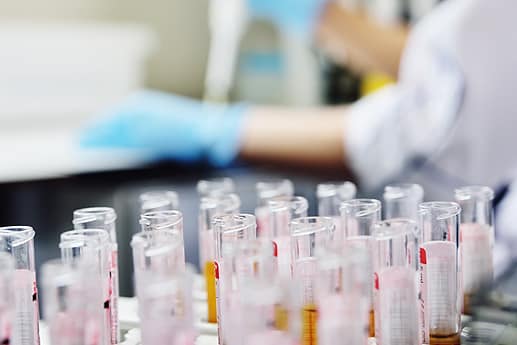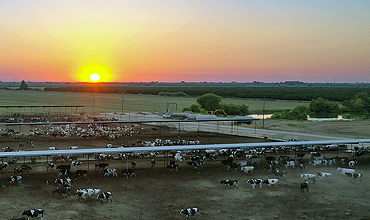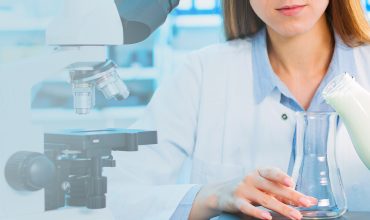From basic DNA testing methods, such as hair sampling, to advanced methods involving sampling of animal tissue.
Genetic testing methods for livestock have significantly evolved in the past few years as a result of technological advances, scientific research related to the mapping of livestock genomes, and situational factors that have created demand for more advanced testing methods. This blog post traces the evolution from more basic DNA testing methods, such as hair sampling, to more advanced methods involving sampling of animal tissue.
Traditionally, livestock producers have collected DNA samples from their animals for multiple reasons, including parentage testing, hereditary trait testing, genetic defect testing, and archiving. One of the first methods introduced was hair sampling, which entails the pulling of a hair from an animal’s tail. While still commonly used, this method can be problematic for a number of reasons. Firstly, as the hair is taken from the tail, the samples often contain traces of manure. In addition, the samples do not always include hair follicles, which are required as they are the source of DNA for testing.
Another common method is blood sampling, which can be submitted to the lab in blood tubes or FTA cards. The card method can be problematic as the cards sometimes arrive at the lab wet and don’t always have enough blood for testing. In addition, the samples are sometimes contaminated with tattoo ink or chemicals that are applied to the animals while they were being processed.
Those issues, which are inherent to more basic DNA sampling methods, often lead to a delay in DNA testing, misidentification (when samples are sent to the lab without the correct identification), sample contamination, and inaccurate results.
Advanced testing requires advanced sampling
In the late-2000s, advanced livestock DNA sampling methods, such as Allflex Tissue Sampling Tags (TST) and Tissue Sampling Units (TSU), started to become available. Their development and fast-growing adoption were driven by several factors and changing market trends, including producers’ growing demand for more advanced genetic selection methods (also known as “genomics”), to help them improve their economics through selective breeding for milk quality and productivity, meat quality and longevity, and more. Also, new scientific discoveries of DNA markers linked to certain traits in livestock, such as resistance to common diseases, also contributed to the development of more advanced testing methods. The advanced sampling tools, such as those provided by Allflex, deliver the high-quality DNA needed for these high-level genomic analyses. In addition, Allflex delivers this tissue in a format that makes it easier for laboratories to test and enables them to automate some of their laboratory procedures.
Disease eradication programs drive adoption of tissue sampling
Another major factor that led to the more widespread utilization of advanced approaches such as tissue sampling tags and units is the implementation of nationwide Bovine Viral Diarrhea Virus (BVDV) eradication programs. In 2008, Switzerland was the first country to recognize the serious financial damage caused by BVDV infection, and implemented a national BDVD eradication program. The Swiss program successfully used tissue sampling methods to test whether calves were born Persistently Infected (PI) with BVDV, and this enabled the efficient identification and removal of these calves from their herds. As a result, other countries such as Belgium, Germany, and Ireland soon followed suit and implemented national BVDV eradication schemes using tissue sampling methods.
State-of-the-art tissue sampling with Allflex solutions
With the aim of helping farmers improve the biosecurity, herd genetics, and traceability aspects of their livestock management strategies, Allflex has focused its efforts on developing advanced tissue sampling solutions that answer changing market needs.
The Allflex Tissue Sampling Tag (TST) and Tissue Sampling Unit (TSU) solutions enable farmers to easily collect small, high-quality tissue samples from an animal’s ear. The samples are self-contained in pre-labeled vials with unique 2D barcodes, which mean that they can be seamlessly linked to other identifiers. This streamlines the sampling and testing process, and facilitates clean and uncontaminated sampling, as well as automated processing in labs, faster results, and a reduced need for resampling.
In addition, as the tissue samples contain a large quantity of high-quality DNA and are stored in a unique liquid buffer that can also be used for DNA testing, they can be stored and used for additional gene testing if required at a later stage. This means that if additional scientific advances are made, there is no need to re-sample the animal.
What’s next for genetic testing?
Tissue sampling and genetic testing have becoming increasingly prevalent and important in the livestock and food industries. They are currently used for a number of different livestock management aspects, including DNA testing, genetic testing, and the diagnosis and eradication of contagious diseases.
Looking ahead, we can expect that four main global needs – to provide food for a growing population, improve sustainability in animal agriculture, improve animal welfare, and meet changing consumer needs – will continue to be significant factors driving the search for new identifiable genetic traits in livestock, and for new and advanced methods that can be used to test for them.
Want to learn more about the Allflex tissue sampling solutions? Start here and contact us
"*" indicates required fields





